By Suzanne Ramsey
It’s a Tuesday evening in March and Curtain Call, the University of Lynchburg’s musical theatre ensemble, is rehearsing the opening number of its upcoming spring cabaret, “Behind the Curtain.” The song, “Coffee in a Cardboard Cup” from the Broadway musical “70, Girls, 70,” is about how all the world’s woes can be traced back to take-out coffee.
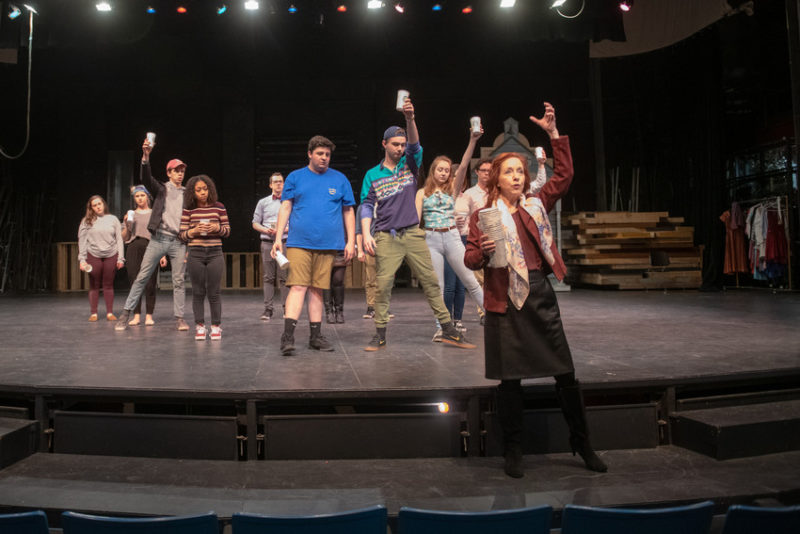
The choreography for the frenetic number involves three circles of students, who, with their backs facing center, move in a counter-clockwise direction while passing paper Starbucks cups in the opposite direction. As one might imagine, it’s confusing.
Loretta Wittman, Curtain Call’s director and choreographer, hands out the cups and instructions. “Starbucks has to be out to the front, since they gave them to us,” she says of the green-and-white cups, after which someone yells in mock accusation, “Product placement!”
When everyone has a cup in hand, Dana Ballard, Curtain Call’s musical director, starts playing the song on her keyboard. The clusters start singing and rotating. A cup flies off stage. There’s a bit of giggling.
The remaining cups are passed clockwise. Sophomore Elizabeth Martin’s shoe is untied, the lace flopping precariously under the sneaker of the person to her right. Someone shouts, “Matt,” meaning Matt Penalva ’21, “seems to be confused!”
All in all, however, it’s going pretty well. “You’re specialists!” Wittman shouts over the ruckus. “You’ll be hired by Starbucks!”
A couple of nights later it’s dress rehearsal for the show’s two-night run. Wittman, who later compared opening night to childbirth, said it’s been “hectic.” At the moment, the drummer is AWOL, the singers are milling about on stage, and Ballard, at the keyboard, says she can’t hear anything from the on-stage monitor.
“Someone sing something,” Wittman tells the group, prompting a cacophony of near-wailing and feedback. Theatre professor Christopher Otwell asks sound designer Cedar Miller ’21 to play something over the speakers. Miller, her asymmetrical hair dyed pink, responds with a techno track. Otwell crosses the stage as it plays and gives a thumbs up.
With the technical problems under control and the drummer’s appearance, Wittman says, “OK, here we go!”
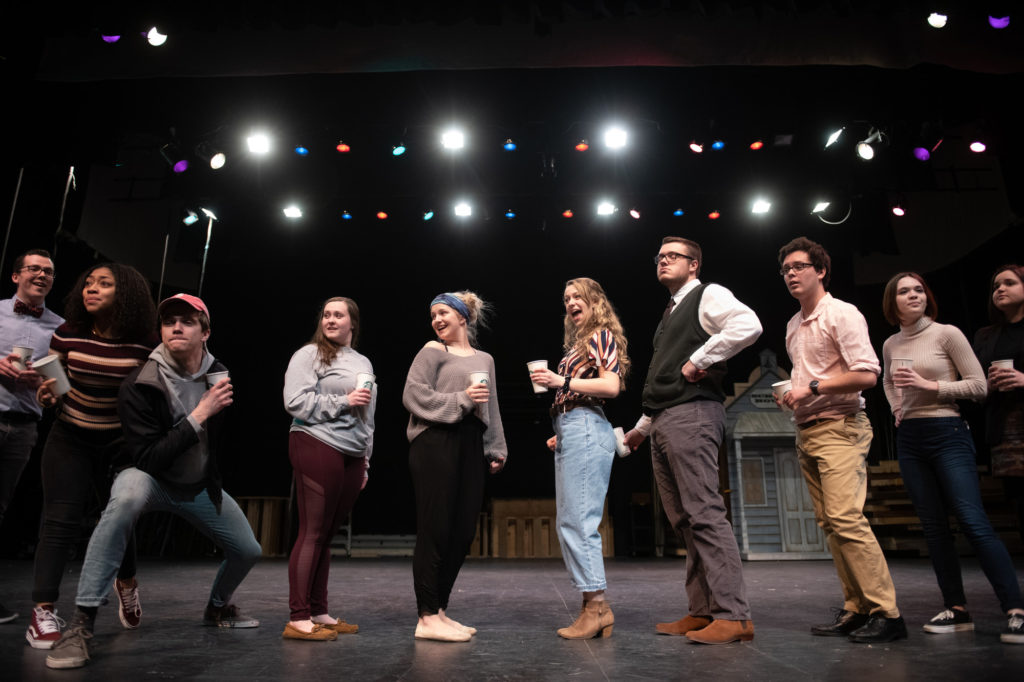
Act I
Two days later, the curtain went up for opening night of “Behind the Curtain.” Throughout the academic year, the group had performed on and off campus as ambassadors for the Theatre Department, but this was their capstone show — time to put it all together and show off.
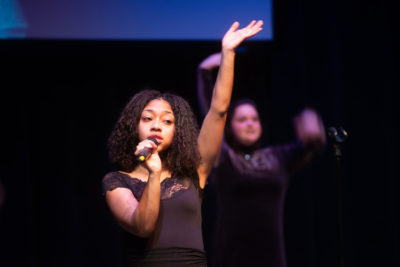
In addition to “Coffee in a Cardboard Cup,” the lineup included songs from several popular Broadway musicals and movies, including “Spamalot,” “Reefer Madness,” “Les Miserables,” “Newsies,” “Chicago,” “Moulin Rouge,” and “The Greatest Showman.”
Wittman said one reason she and Ballard started Curtain Call two years ago was to give students the opportunity to perform songs from popular musicals that colleges and universities are not yet able to license.
“In other words, if we wanted ‘Dear Evan Hansen’ or ‘Hamilton,’ they’re not available for licensing, but it’s important for our students to have contact with and work with that material,” Wittman said.
Addy Weaver ’20, who had a solo during the “Moulin Rouge” set, agreed. “When you’re in a collegiate theatre program, there aren’t many opportunities to sing songs from contemporary musicals,” she said.
“However, our directors sought [to form] a group that would allow us to just do that. … All of that music you listen to when you’re lying in bed at night by yourself and dreaming of the day you’ll get to sing it is the music we perform in this group.”
Some songs are suggested by students. Others are selected by Wittman and Ballard. “Loretta and I try to think about songs that will match each student’s vocal quality and personality, and we put it all together,” Ballard said. “So many times, I will hear a song and think, ‘That would be just perfect for so-and-so!’ I try to choose carefully to get just the right number for the right student.”
“All of that music you listen to when you’re lying in bed at night by yourself and dreaming of the day you’ll get to sing it is the music we perform in this group.”
– Addy Weaver ’20
The spring cabaret had three songs from “Spamalot,” a Broadway musical that draws from movies and sketches made famous by the iconic British comedy troupe Monty Python. First, Hanna McWilliams ’19 and Evan Gough ’19 sang “The Song That Goes Like This,” a spoof on musical theatre songs.
McWilliams was dressed in a blue, floor- length, sequined evening gown, while Gough sported a poncho-like getup with a red cross and belt à la Sir Robin from “Monty Python and the Holy Grail.” Near the end of the song and sounding increasingly frustrated, the pair sang, “I can’t believe there’s more. It’s far too long, I’m sure. It goes on and on and on. For this is our song that is too long.”
McWilliams, who graduated in May and plans to pursue a master’s degree in social work, said it was fitting to end her theatre career at Lynchburg with the duet. “It was super fun,” she said. “Evan and I have been together for most of our college careers, so it was nice to end my theatre career in college with the person who means the most to me.”
Next, Chris Young ’20, Timothy McFadden ’23, and the men’s ensemble took the stage for a mashup of songs from “Holy Grail” and “Life of Brian,” a Monty Python movie that tells the story of a man named Brian who unwittingly follows in the footsteps of Jesus.
Young, a Monty Python fan, had been looking forward to his solo in “Always Look on the Bright Side of Life.” It’s a lighthearted ditty from “Life of Brian,” in which Brian finds himself crucified between two thieves and tries to make the best of it.
“I have always been a big fan of Monty Python and ‘Spamalot,’ so this song always brings me a lot of joy,” Young said. “It makes me think about sitting on the couch with my dad and brothers, watching ‘Life of Brian,’ laughing, and enjoying the movie and company.”
In the “Reefer Madness” set, theatre majors Penalva and Martin sang “Romeo and Juliet,” a song where two people, who have obviously never read the famous Shakespeare tragedy, sing about the wonderfully romantic lines in “Romeo and Juliet” and how they’re sure everything worked out OK in the end.
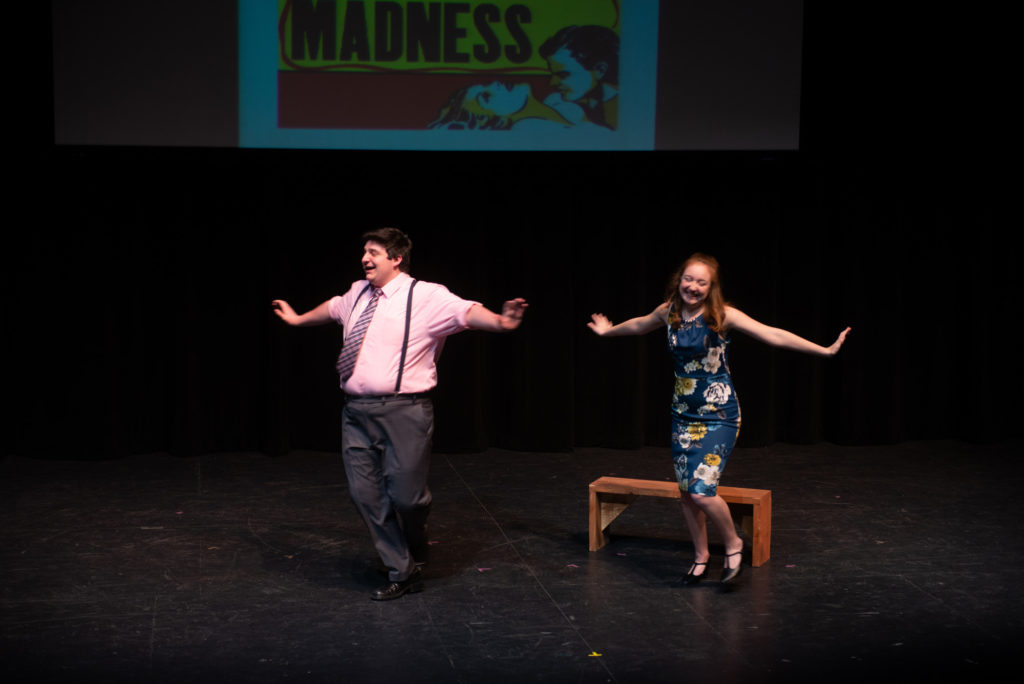
For Penalva, performing with Curtain Call puts him one step closer to the Great White Way. “I want to be on Broadway,” he said. “That is my end goal. I know that is very bold to say, but Broadway has been something I’ve dreamed of since I started high school and I think Curtain Call is definitely going to help.”
The longest set of the night was a medley from “Les Miserables,” including the heart-breaking “I Dreamed a Dream,” sung by Brooke Bosiger ’19. For Bosiger, the solo was a dream come true.
“‘Les Miserables’ is my favorite book and musical,” Bosiger, a theatre major, said. “When I heard we were singing a medley from the show, I desperately wanted a solo. I was lucky enough to receive one and it was my favorite song to sing in the show. It’s very deep and impactful and I wanted to relay that to the audience as best as I could.”
Act II
The set that drew the most hoots and hollers from the audience was “Broadway Backwards,” a gender-bending pair of songs where traditional male and female roles were swapped. First, Curtain Call’s women donned trouser and newsboy hats and banded together for a rousing version of “The World Will Know,” from the musical “Newsies.”
Carrying homemade protest signs, the Newsies marched back and forth across the stage singing, “Pulitzer may own the world, but he don’t own us! Pulitzer may crack the whip, but he won’t whip us!” and thrusting their fists defiantly into the air.
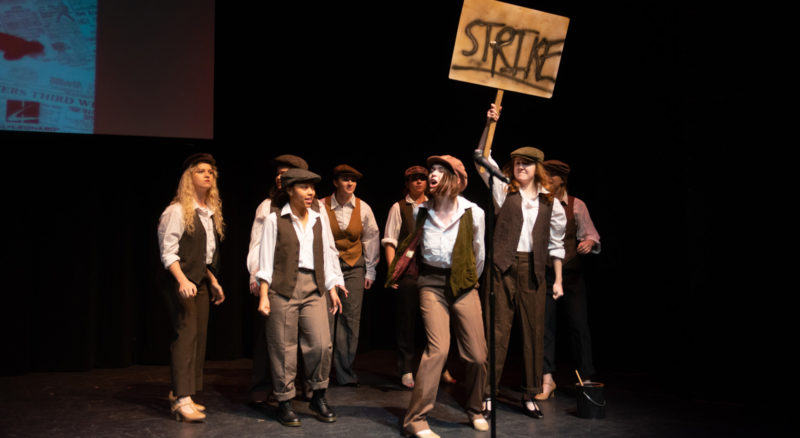
For Macarah Dent ’22, the whole thing was inspiring. “Having the roles reversed was such a fun concept, and being a Newsie for just one song was such a fun experience,” she said. “It made me feel empowered and I loved everything about it.”
Being a Newsie spoke to Ellee Evans ’19, too. “That number bonded the girls together like glue,” Evans, a theatre major, said. “We had all our own personal reasons we loved that song … and all of us had the freedom to put our hearts into it.
“We would be all out of breath together by the end of the song. We were also dressed like newsboys. It was just so fun and powerful. It was my favorite.”
Brianna Yancey ’21, a music major and fellow Newsie, auditioned for Curtain Call a year ago.
She said she’s learned how to “be comfortable with myself, both on and off-stage” and “become confident in my artistic abilities,” things she knows will help in her future career as a director and choreographer.
“My absolute dream goal would be working with Hello Sunshine production company, helping women get into film, acting, and theatre,” she said of the media company co-founded by actress Reese Witherspoon. “Curtain Call definitely helps with my ability to work with different styles, shows, etc., thus opening my range of directing ability.”
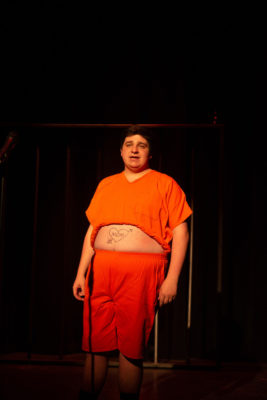
After “The World Will Know,” the men’s ensemble slinked around onstage to the “Cell Block Tango,” from “Chicago.” The scene opened with sirens and a tough-guy cop introducing the “Six Merry Murderers of the Cook County Jail,” all of whom posed seductively behind bars in orange-and-white prison garb.
Penalva, who had added a mom-in-heart “tattoo” to his exposed belly, said the “Cell Block Tango” was one of his favorite parts of the show. “Oh wow! That was so much fun,” he said afterward. “And it was surprisingly more difficult than we thought it would be, but it was a good kind of difficult and was just so great.”
For Young, also part of the “Cell Block Tango,” Curtain Call was an introduction to musical theatre. “I like learning about a genre that I’m not very familiar with,” said Young, who spent half of the last academic year performing with the Gloucester Cathedral Choir in England.
“The group has helped me learn about Broadway shows, acting, and choreography. This experience has also taught me teamwork and how everyone in the group brings their own skills and experiences to help one another and make a great, unique performance.”
Act III
“Curtain Call helps me come out of my shell and be able to express myself, so I know that can only help in the future.”
– Macarah Dent ’22
Young isn’t the only Curtain Call member who stepped out of their comfort zone. The group, which holds annual auditions and twice-weekly classes in addition to other rehearsals, is open to students in all academic majors.
Dent, one of the Newsies, is a nursing major attending Lynchburg on a performing arts scholarship. “[It] won’t directly affect my career,” she said of her involvement in Curtain Call. “However, it will help me be less nervous in front of bigger audiences, or even having to talk to families of patients.
“Curtain Call helps me come out of my shell and be able to express myself, so I know that can only help in the future.”
Weaver, a psychology major who plans to eventually teach at the college level, has had a similar experience. “Curtain Call forces me to expel my fears,” she said. “Although I will never have to remember all the choreography to a ‘Greatest Showman’ song at my job, I will have to get in front of a group of people and ‘wow’ them. Doing it more often is helpful to easing my performance anxiety.”
Weaver, who came to Lynchburg from Newark, Ohio, said the friends she’s made through Curtain Call are a plus. “Curtain Call spends a lot of time together, and even though I’m not in the class this semester — I have another class that conflicts — I still am good friends with the people in it,” she said.
“There’s something so intimate and vulnerable about performing together. We all bond over a shared vision. We also are theatre people, so there’s a lot of jokes and being goofy. I really can be myself around everyone.”
Act IV
With “Behind the Curtain” behind them, the members of Curtain Call spent the rest of the semester focused on their next performance, which was part of the Curtain Up songwriters’ workshop.
For the second year in a row, Wittman and Ballard invited emerging songwriters from New York City to collaborate with members of Curtain Call on original songs that would be performed at the ensemble’s final show of the year, “Curtain Up.”
This year’s songwriters included Preston Max Allen, Heath Saunders, Sarah Fiete, and the songwriting teams of Teresa Lotz and Naomi Matlow and Seth Christenfeld and James Ballard. James, son of Curtain Call’s musical director Dana Ballard, used his songwriting connections in New York to make “Curtain Up” possible.
To start the creative process, members of Curtain Call responded to a series of prompts dealing with victory or the proverbial “phoenix rising from the ashes,” which was followed by some back and forth between the songwriters and singers.
This year, three students collaborated with songwriters on solos and Saunders composed an ensemble piece, “Requiem for a Phoenix.” The “Curtain Up” performance would be the world premiere for each song. Bosiger teamed up with Christenfeld and James Ballard, the creative team behind the musical “The Oxford Epidemic.” She described her song, “No World to Win,” as “sultry” with a “James Bond-type of feel to it.”
During the collaboration, Bosiger FaceTime-ed with the songwriters and offered suggestions to their rough draft. She said they “definitely took a lot of my opinions and ideas into consideration.” She called the experience “overall amazing” and said, “I’m very blessed to have been a part of it.”
Penalva worked with Preston Max Allen, writer, composer, and lyricist behind “We Are The Tigers,” which was performed off-Broadway this past spring. Allen wrote “Spring Musical Auditions,” a quirky song about a boy who tries out for a play based on the “Transformers” series.
“I remember, when he told me his idea, I was just like, ‘Wow, yes!’ I love everything about this,” Penalva said. “It’s hilarious and so much fun.”
While it doesn’t tell the true story of his high school theatre experience, Penalva admitted the song was “very me” and shows “how much of a theatre nerd I really am.”
Act V
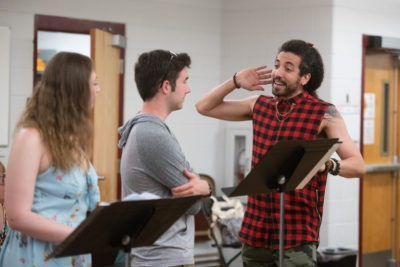
As part of the songwriters’ workshop, Saunders and James Ballard, the workshop’s artistic director for the past two years, came down from New York City to spend some time on campus with Curtain Call.
Over the course of the week, they met with the students for classes, rehearsals, a round-table lunch, and other events, culminating with the “Curtain Up” performance at Dillard Fine Arts Center.
“It was good for the students to see Heath and James working together as collaborators,” Ballard said later, adding that while the students all know James as “Mrs. Ballard’s son,” he is “the one with the connections on Broadway in New York and the one who knows all the exciting people, like Heath, well enough to invite them down to Lynchburg.”
Saunders, an award-winning playwright who has acted both on- and off-Broadway, spent an evening rehearsing “Requiem for a Phoenix” with the ensemble. Wittman described the song as “incredibly difficult and complex,” but said the students were “rising to the occasion.”
Young, who had spent time with Saunders earlier that day in another class, said having the song’s composer on campus was a bonus. “It’s great to have a composer actually there, so he can talk about what he wants,” he said. “You don’t usually have the pleasure. He talks a lot about the vocal aspect of it. Acting is the secondary and vocal is primary.”
Later that week, Saunders held a master class in Snidow Chapel, where several members of Curtain Call got some individualized attention. One of them was Penalva, who sang “Out There” from “The Hunchback of Notre Dame.”
After Penalva’s first run-through, Saunders responded with “Bravo, bravo, bravo, bravo,” but then asked him to sing it again. This time, Saunders wanted Penalva to follow him around the chapel while he sang, so he wasn’t “acting.”
So Penalva commenced to almost chase Saunders around the chapel as he sang about being “out there” in the world among the “millers and the weavers and their wives.” When Penalva was finished and near panting, Saunders stopped and said, “Cool, cool, cool, cool, cool.”
He added, “It sounded much less like you’re trying to sing.”
Ballard, who accompanied the students on piano, said Saunders’ background as a composer “brought great insight to all of us. Students are used to hearing, ‘Sing with more energy!’ ‘Sing with more emotion!’ ‘Use more breath support!’ These are good, but general, suggestions.
“Heath kept taking the students back to the musical score again and again and urging them to follow the composer’s instructions. I have attended many master classes in my time, and this was a revelation even to me: Keep looking at the music. The composer has told you everything you need to know.”
Asked about working with the songwriters, Penalva — not surprisingly — responded enthusiastically. “This experience was so incredible!” he said. “I loved, so very much, being able to work with Heath. He was like no one else that I had ever worked with before and it was just an amazing experience!
“Preston was such a nice guy and I loved working with him as well! It was so cool! I loved this experience and I really hope to be able to work with both Heath and Preston again in the future, maybe when I’m living and working in NYC professionally.”

